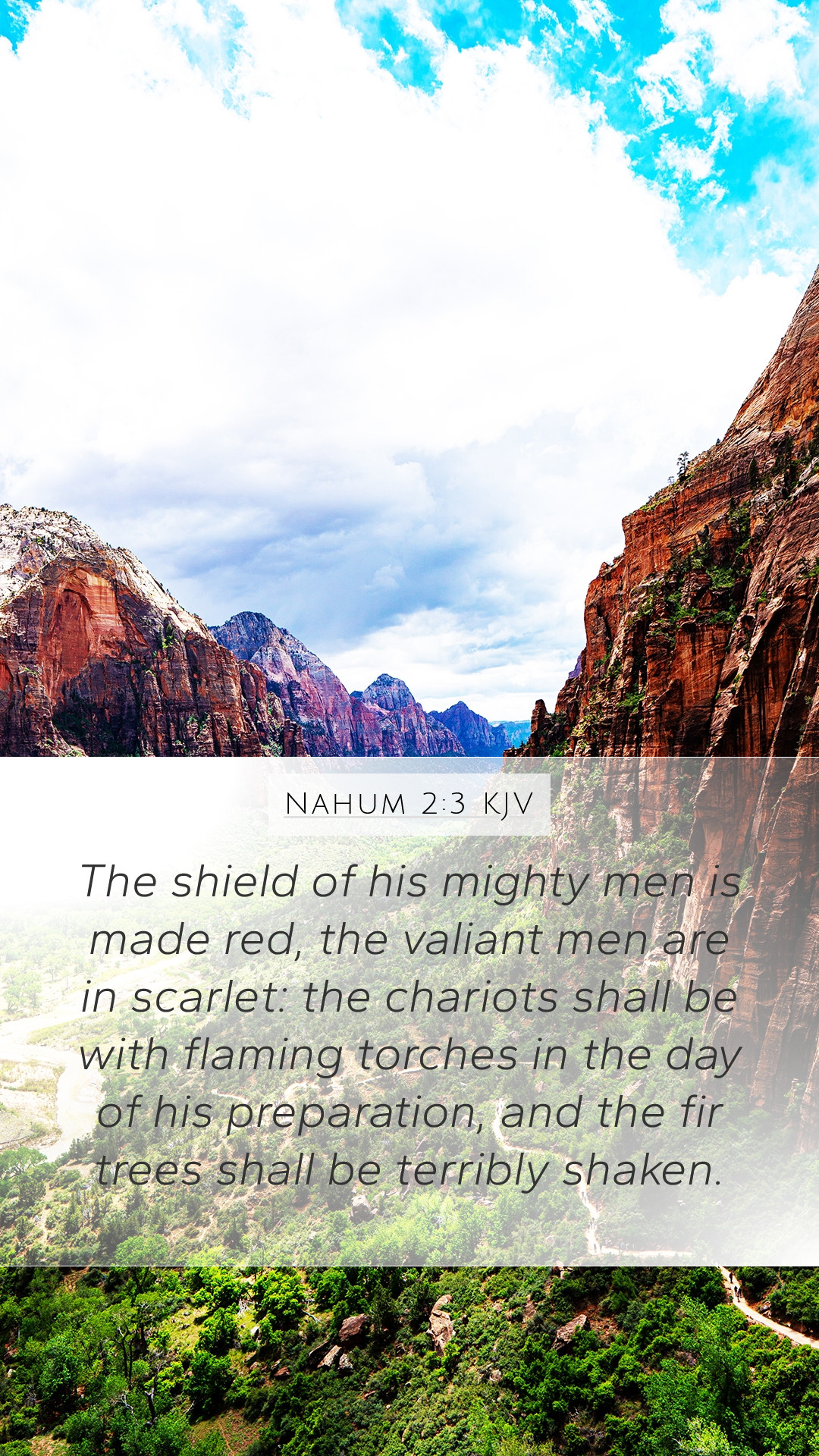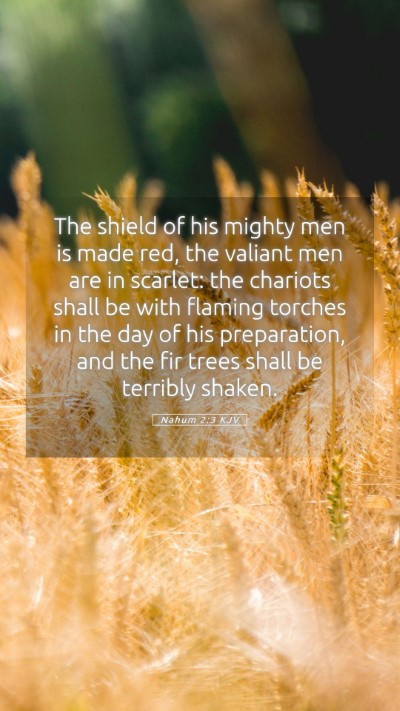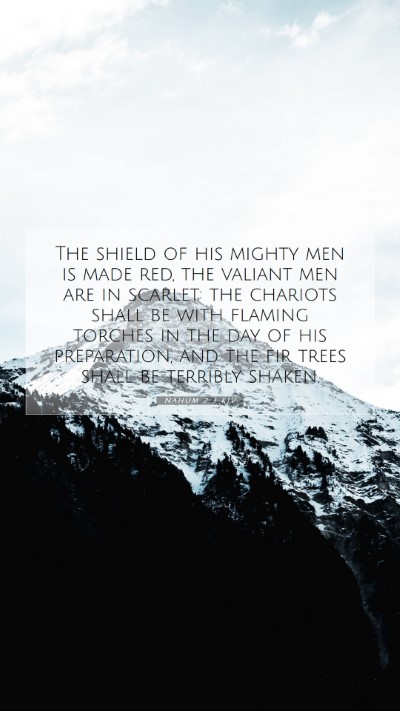Old Testament
Genesis Exodus Leviticus Numbers Deuteronomy Joshua Judges Ruth 1 Samuel 2 Samuel 1 Kings 2 Kings 1 Chronicles 2 Chronicles Ezra Nehemiah Esther Job Psalms Proverbs Ecclesiastes Song of Solomon Isaiah Jeremiah Lamentations Ezekiel Daniel Hosea Joel Amos Obadiah Jonah Micah Nahum Habakkuk Zephaniah Haggai Zechariah MalachiNahum 2:3 Meaning
What is the meaning of Nahum 2:3?
The shield of his mighty men is made red, the valiant men are in scarlet: the chariots shall be with flaming torches in the day of his preparation, and the fir trees shall be terribly shaken.
Nahum 2:3 Bible Verse Meaning
Nahum 2:3 - Bible Verse Explanation and Commentary
In Nahum 2:3, the prophet Nahum paints a vivid picture of the coming destruction of Nineveh, the capital of the Assyrian Empire. This verse serves as a warning and a powerful reminder of God's justice and the consequences of wickedness. By exploring its meaning, we gain insights that enhance our understanding of Scripture and deepen our Bible study insights.
Context of Nahum 2:3
The book of Nahum is a prophetic declaration against Nineveh, detailing God’s impending judgment due to the city's cruelty and idolatry. Nahum's message is meant for the people of Judah, encouraging them to understand that their oppressors will face the wrath of God.
Summary of Nahum 2:3
Nahum 2:3 (KJV): "The shield of his mighty men is made red, the valiant men are in scarlet: the chariots shall be with flaming torches in the day of his preparation, and the fir trees shall be terribly shaken."
This verse captures the intense preparation of Nineveh's defenders and the impending chaos that will soon ensue. The imagery of scarlet shields and burning chariots conveys both the strength of Nineveh's military might and the destructive force that God will unleash upon them.
Insights from Public Domain Commentaries
-
Matthew Henry Commentary:
Matthew Henry emphasizes the stark contrast between the preparations of Nineveh for battle and the certainty of their downfall. He highlights the futility of human strength against divine judgment. The imagery of red shields signifies the readiness for war, yet it also foreshadows bloodshed, indicating that their might cannot save them from God's decree.
-
Albert Barnes Commentary:
Albert Barnes points out that the description of the mighty men in scarlet and the chariots with flaming torches emphasizes the grandeur of Nineveh's military. However, he clarifies that these preparations will ultimately lead to their destruction. The "terribly shaken fir trees" symbolizes the shock and fear that will envelop the city as God’s judgment falls.
-
Adam Clarke Commentary:
Adam Clarke provides a discussion on the practices of wartime and the significance of color in the ancient Near East. The use of scarlet indicates valor, but Clarke stresses the ironic twist that, despite their bravery and readiness, Nineveh's fate is sealed. The impending destruction serves as a lesson in humility and reliance on God's sovereignty.
Analysis of Key Themes in Nahum 2:3
-
Divine Judgment:
Nahum 2:3 illustrates God’s judgment against sin. While Nineveh prepares for battle, they are blind to the reality of God’s justice that is swift and inevitable.
-
Human Strength vs. Divine Power:
The verse emphasizes that human preparations and military strength are insignificant against the power of God. It serves as a reminder of the limitations of worldly defenses in the face of divine retribution.
-
The Symbolism of Color:
The colors described, especially red, evoke both valor in battle and the bloodshed that will follow. This duality underscores the gravity of conflict and the ultimate consequences of sin.
-
Preparation for Disaster:
The imagery of chariots and torches highlights the urgency of preparation, which ironically leads to their own ruin. This serves as a wake-up call for all nations to recognize the times and to seek repentance.
Cross References
- Isaiah 10:5-6: God raises up Assyria as an instrument of judgment but will punish them for their cruelty.
- Zephaniah 2:13-15: A prophecy against Nineveh's destruction, emphasizing God’s control over the nations.
- Habakkuk 1:6: God will send the Chaldeans as a fierce nation, similar in theme to Nahum’s warning.
Conclusion
Nahum 2:3 serves as a powerful reminder of the nature of divine justice and retribution. Through this verse, we gain Bible verse understanding and interpretation, realizing that preparation without righteousness is futile. As we study the Scriptures, let us reflect on the timeless truths contained within, recognizing the need for emotional and spiritual vigilance in our lives.
Further Study Resources
For those looking to delve deeper into Bible study, various resources and study guides are available that focus on prophetic literature and the themes within the Old Testament. Engaging in Bible study groups or online Bible study courses can provide valuable insights into understanding difficult Bible passages.
This exploration of Nahum 2:3 not only enhances our biblical exegesis but also enriches our faith as we contemplate the significance of God's message throughout history and its application to our daily lives.


